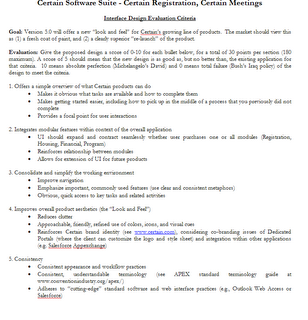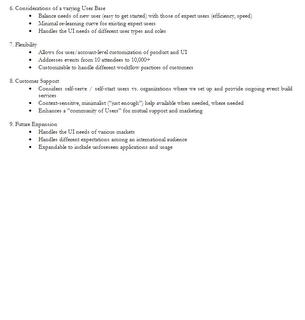Background
The FFA (formerly called the "Future Farmers of America") is a national association of state FFA chapters. They hired Jeff Rasco and Rod Marymor of Tech3 Partners to mangage their selection of an Online Convention Registration (OCR) application. Tech3 worked with FFA to determine their key needs and to deliver a detailed RFP to all major online event registration vendors. Certain was one of four finalists selected to present to the FFA operations committee at their headquarters, and in March 2005 we signed a multi-year contract.
Time to Deliver
Now, 18 months later, the 79th National FFA Convention begins today at the RCA Dome and convention center in Indianapolis. After a pilot test at last year's convention in Louisville, the implementation team from Certain (Bob Osborn, Sr. Account Manager, Brett Weigl, Director of Client Services, and I) was ready to handle FFA's somewhat unique online registration requirements. These include:
Registration
- The National FFA Convention will have around 50,000 attendees, separated into about 50 groups such such as exhibitors, members, alumni, advisors, parents, staff, press, speakers, judges, etc. FFA used Register123's unlimited registration categories to manage these groups.
- With 50,000 attendees, the FFA had to schedule three Opening Sessions of ~15,000 - 18,000 each in the RCA Dome. They wanted to limit the total number of tickets selected for any of the three Opening Sessions to be equal to or less than the total number of registrations purchased. (Apparently, in past years some advisors took advantage of an older registration system by splitting their groups into multiple Opening Sessions and getting more "free" opening session tickets than the number of registrations they purchased.) FFA used Register123 Packages and Form Logic in order to enforce this complex business requirement.
- FFA has an existing Web Site with state chapter login, which is integrated with their PeopleSoft CRM database. They used Register123 Form Integration features to seamlessly pass state chapter information from their web site intranet to the registration form when each registrant clicked on the "Register" hyperlink.
Ticket Management
- State chapter advisors register multiple student attendees at once, and FFA only collects the contact information for the advisors. FFA used Register123's unlimited Program Module in order to enter more than 175 sessions, tours, concerts, parking passes, etc., where advisors purchased 1-100 tickets at a time for each item.
- FFA delivers paper tickets and purchased items to all pre-registered attendees. They used Register123 Personal Documents to create a custom "Pick Plan", which their warehouse technicians used to prepare indivudal packets and ship via UPS.
- FFA also used Register123 Web Integration Links to integrate with the UPS Worldship application, so that employees or attendees could use their Registration Code to track their package shipment on the UPS web site with a single click.
Financials
- The National FFA Convention must cover its expenses through registration fees and additional fees for tours and concerts. FFA processed over a million dollars via Register123's Financial Module using integrated credit card processing and check/P.O. payments.
- FFA uses Peoplesoft Financials and CRM application as their association management solution. Their IT team used Register123's Budget Module to store the PeopleSoft General Ledger Account Numbers with each fee, and Register123 Custom Reports to create batch files with payment and fee information. The reports were customized with the column headers and tab-delimited text format required by FFA's automatic nightly import into Peoplesoft.
Housing
- The FFA worked with the Indianapolis Convention & Visitors Association (ICVA) to contract rooms with nearly every hotel in Indianapolis (162 hotels with 12,000 peak room nights and over 30,000 total room nights). The ICVA used Passkey to manage the city-wide housing reservations for FFA. Register123 integrates with Passkey to provide a seamless registration system for attendees.
- In order to meet their hotel commitments, the FFA offered discounted registration ($30 vs. $40 per person) for attendees who book inside their room block. Because students often stay four or five per room, the FFA wanted to allow only up to 5 discounted registrations per room reservation processed within the block. FFA used Register123's "Packages" feature of the Program Module and "Form Logic" feature in order to enforce these business requirements on their attendees.
On-Site Registration
- About 10,000 attendees and advisors register on-site, and many pay with cash or pre-printed checks drawn on purchase orders. FFA used Register123's on-site registration features to create simple "Admin-side forms" that registration desk temp workers were able to learn and use after less than 10 minutes of training.
- FFA used Register123's "split payments" and "cash payments" features in order to process multiple payments against a single order, to accept cash on-site, and to calculate change. Register123 payments reports tracked cash receipts per registration desk worker (with an audit trail based on user name and date-time posted) in order to maintain cash security on-site. (The six foot - six inch off-duty police officer helped this situation, I think.)
I'll post more information (and pictures) tomorrow showing all of this in action from behind the on-site registration desk.


